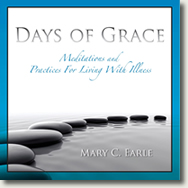Day Twenty-Four
Do You Work Wonders for the Dead?
Meditation: <listen>
Psalm 88:11Do you work wonders for the dead?
—
From time to time the voice we hear in the psalms takes us aback. I don’t know about you, but I was socialized not to ask this kind of question of God. For heaven’s sake, when we are praying we need to be on our best behavior, right?
The ancient Hebrews would tell us we have it all wrong. The voice we hear in the psalms tells God just how hard life is at times. Occasionally we come across a line that is good to know for this pilgrimage of living with illness: “How long, O LORD?” (Ps. 13:1) or “Have mercy upon us, O LORD, have mercy, for we have had more than enough of contempt.” (Ps. 123:4)
Today we hear this line from Psalm 88, a line that almost taunts God. “Do you work wonders for the dead?”
Can you imagine allowing yourself to be that honest with God? Years ago my spiritual director said to me, “Mary, if you think that God will disappear in the face of your hurt and your questions, then that is not God.” That counsel, and the example of the bald honesty we find in the psalms, has led me to rail at God from time to time about my own illness, about Bryan’s cancer, about the terrible afflictions that many endure.
As my director pointed out, speaking the truth that is in my heart and soul allows for a true and deep relationship in prayer to develop. When I only pray what I think God wants to hear, I miss this truth: God already knows what is in my heart and is well familiar with my despair, my fear, my anger, my fragile faith.
Gracious God, grant me the grace to tell You the truth, to trust You enough to let anger and fear come to speech and be transformed. May I remember that You know me better than I can know myself. Amen.

Practice: <listen>
Choose one fear or hurt or anger that you have not laid before God in prayer. Trust that in the ancient tradition of the Hebrew psalms, you may speak that into being. Trust that God will not disappear in the face of your saying what you need to say, and what is already known to this loving God in whom we live and move and have our being. Trust that God is infinitely merciful, and will not leave you in the face of your fear or hurt or anger. Let the prayer be real. Let the speech be as raw as it needs to be.
If you perceive that you need a spiritual friend or director to be with you in this practice, wait to offer it until you can be in the presence of that person.
Reference Note: All psalms are taken from the psalter in The Book of Common Prayer, 1979.

